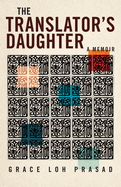
Grace Loh Prasad's thoughtful memoir, The Translator's Daughter, explores the challenges of being a "linguistic outsider" in her homeland of Taiwan. In a series of loosely connected essays, Prasad examines themes of memory, dislocation, grief, and familial bonds through her experiences as "neither an insider nor a foreigner, but in between."
The daughter of highly educated parents, Prasad was just two years old when her family was forced to immigrate to the U.S. for fear of political persecution. After several years in New Jersey, the family moved to Hong Kong, and although her parents later returned to Taiwan permanently, Prasad never regained her fluency in Taiwanese. As an adult, she visited her parents regularly but never had to worry about navigating the place on her own--until first her mother and then her father fell ill. Prasad details her struggles with Taiwanese hospitals and funeral homes and the emotional gaps created by living half a world away from her parents. She recounts joyous moments with her Taiwanese family but admits to always feeling a bit off-balance in Taiwan. Prasad's essays weave together her experiences with stories from her parents' lives, analyses of changes in Taiwanese politics, and musings on David Bowie songs, Louise Bourgeois sculptures, and other cultural artifacts that help her make sense of her layered identity.
Despite (or perhaps because of) her struggles with belonging, Prasad's memoir is a tender tribute to her multilingual parents and a sensitive evocation of life as part of the Asian diaspora. --Katie Noah Gibson, blogger at Cakes, Tea and Dreams

